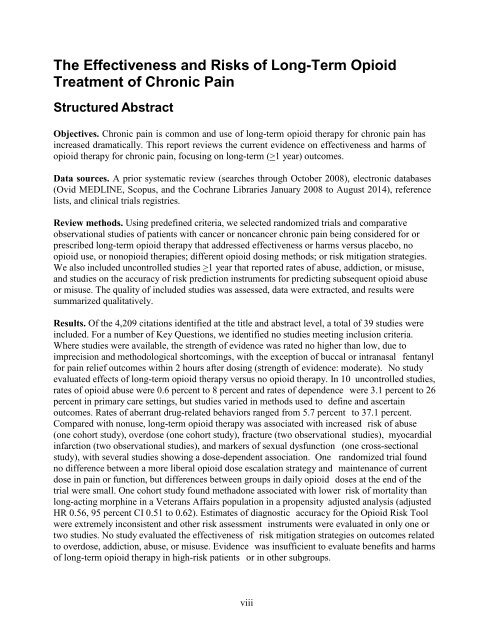chronic-pain-opioid-treatment-report-140929
chronic-pain-opioid-treatment-report-140929
chronic-pain-opioid-treatment-report-140929
Create successful ePaper yourself
Turn your PDF publications into a flip-book with our unique Google optimized e-Paper software.
The Effectiveness and Risks of Long-Term OpioidTreatment of Chronic PainStructured AbstractObjectives. Chronic <strong>pain</strong> is common and use of long-term <strong>opioid</strong> therapy for <strong>chronic</strong> <strong>pain</strong> hasincreased dramatically. This <strong>report</strong> reviews the current evidence on effectiveness and harms of<strong>opioid</strong> therapy for <strong>chronic</strong> <strong>pain</strong>, focusing on long-term (>1 year) outcomes.Data sources. A prior systematic review (searches through October 2008), electronic databases(Ovid MEDLINE, Scopus, and the Cochrane Libraries January 2008 to August 2014), referencelists, and clinical trials registries.Review methods. Using predefined criteria, we selected randomized trials and comparativeobservational studies of patients with cancer or noncancer <strong>chronic</strong> <strong>pain</strong> being considered for orprescribed long-term <strong>opioid</strong> therapy that addressed effectiveness or harms versus placebo, no<strong>opioid</strong> use, or non<strong>opioid</strong> therapies; different <strong>opioid</strong> dosing methods; or risk mitigation strategies.We also included uncontrolled studies >1 year that <strong>report</strong>ed rates of abuse, addiction, or misuse,and studies on the accuracy of risk prediction instruments for predicting subsequent <strong>opioid</strong> abuseor misuse. The quality of included studies was assessed, data were extracted, and results weresummarized qualitatively.Results. Of the 4,209 citations identified at the title and abstract level, a total of 39 studies wereincluded. For a number of Key Questions, we identified no studies meeting inclusion criteria.Where studies were available, the strength of evidence was rated no higher than low, due toimprecision and methodological shortcomings, with the exception of buccal or intranasal fentanylfor <strong>pain</strong> relief outcomes within 2 hours after dosing (strength of evidence: moderate). No studyevaluated effects of long-term <strong>opioid</strong> therapy versus no <strong>opioid</strong> therapy. In 10 uncontrolled studies,rates of <strong>opioid</strong> abuse were 0.6 percent to 8 percent and rates of dependence were 3.1 percent to 26percent in primary care settings, but studies varied in methods used to define and ascertainoutcomes. Rates of aberrant drug-related behaviors ranged from 5.7 percent to 37.1 percent.Compared with nonuse, long-term <strong>opioid</strong> therapy was associated with increased risk of abuse(one cohort study), overdose (one cohort study), fracture (two observational studies), myocardialinfarction (two observational studies), and markers of sexual dysfunction (one cross-sectionalstudy), with several studies showing a dose-dependent association. One randomized trial foundno difference between a more liberal <strong>opioid</strong> dose escalation strategy and maintenance of currentdose in <strong>pain</strong> or function, but differences between groups in daily <strong>opioid</strong> doses at the end of thetrial were small. One cohort study found methadone associated with lower risk of mortality thanlong-acting morphine in a Veterans Affairs population in a propensity adjusted analysis (adjustedHR 0.56, 95 percent CI 0.51 to 0.62). Estimates of diagnostic accuracy for the Opioid Risk Toolwere extremely inconsistent and other risk assessment instruments were evaluated in only one ortwo studies. No study evaluated the effectiveness of risk mitigation strategies on outcomes relatedto overdose, addiction, abuse, or misuse. Evidence was insufficient to evaluate benefits and harmsof long-term <strong>opioid</strong> therapy in high-risk patients or in other subgroups.viii


